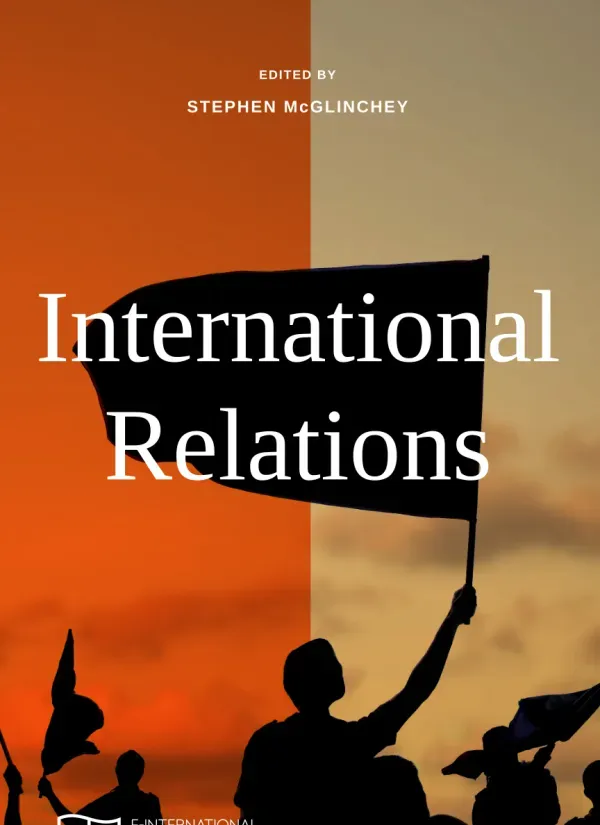
Introduction to International Relations
Document information
| Author | Stephen McGlinchey |
| instructor | PTS. Nguyễn Văn A |
| School | University of the West of England, Bristol |
| Major | International Relations |
| Year of publication | 2017 |
| Place | Bristol, England |
| Document type | edited book |
| Language | English |
| Number of pages | 238 |
| Format | |
| Size | 1.31 MB |
- International Relations
- Global Governance
- Educational Resources
Summary
I. Introduction to International Relations
The field of International Relations (IR) encompasses a wide array of concepts, theories, and practices that shape the interactions between states and non-state actors on the global stage. This introductory section emphasizes the importance of understanding the dynamics of global politics in a rapidly changing world. Scholars and practitioners contribute diverse perspectives, making the study of IR both complex and essential. The book serves as a foundational text, aiming to equip readers with the necessary tools to navigate the intricacies of international affairs. As noted by Marta Dyczok, it is crucial to grasp how global events influence local realities. The text is designed to be accessible, ensuring that even those new to the subject can engage with its content effectively.
1.1 Importance of Understanding Global Dynamics
In an era marked by turbulence and interconnectedness, the significance of comprehending international relations cannot be overstated. Mukesh Kapila highlights that everyone is impacted by global events, underscoring the necessity for individuals to understand the mechanisms of international politics. This understanding fosters informed citizenship and enhances the ability to engage in global discourse. The text provides a comprehensive overview of key issues, concepts, and dynamics, making it an invaluable resource for students and practitioners alike. The emphasis on a student-centered approach ensures that the material is relevant and applicable to real-world scenarios.
II. Key Concepts in International Relations
The book delves into fundamental concepts that underpin the study of international relations. Topics such as diplomacy, international law, and global governance are explored in depth. Each concept is presented with clarity, allowing readers to grasp their significance in the broader context of global affairs. Stephen McGlinchey, the editor, emphasizes the need for a well-rounded understanding of these concepts to navigate the complexities of international interactions. The text serves as a guide, providing essential knowledge that is crucial for both academic and practical applications in the field of IR.
2.1 The Role of Diplomacy
Diplomacy is a cornerstone of international relations, facilitating communication and negotiation between states. The text outlines various diplomatic strategies and their implications for global stability. Understanding the nuances of diplomacy is vital for anyone engaged in international affairs. As Richard Ned Lebow articulates, a thoughtful approach to diplomacy can lead to more effective conflict resolution and cooperation among nations. The book's exploration of diplomatic practices equips readers with the skills necessary to engage in meaningful dialogue and foster international collaboration.
2.2 International Law and Global Governance
International law serves as a framework for regulating the conduct of states and international organizations. The text discusses the evolution of international law and its role in promoting global governance. Knut Traisbach's contributions highlight the importance of legal norms in maintaining order and justice in international relations. The understanding of international law is essential for addressing global challenges, such as human rights violations and environmental issues. This section emphasizes the practical applications of international law in fostering cooperation and accountability among states.
III. Contemporary Issues in International Relations
The book addresses pressing global issues that shape the current landscape of international relations. Topics such as global poverty, transnational terrorism, and environmental challenges are examined. Each issue is contextualized within the framework of international relations, providing readers with a comprehensive understanding of their implications. The text emphasizes the interconnectedness of these issues, illustrating how they influence one another and require coordinated responses from the global community. The insights provided are crucial for developing effective strategies to tackle these challenges.
3.1 Global Poverty and Wealth Disparities
Global poverty remains a significant challenge in the realm of international relations. The text explores the causes and consequences of wealth disparities, emphasizing the need for sustainable development strategies. James Arvanitakis and David J. Hornsby highlight the role of international cooperation in addressing poverty. Understanding the dynamics of global wealth distribution is essential for formulating policies that promote equity and social justice. The book serves as a call to action for scholars and practitioners to engage in efforts aimed at reducing poverty and fostering inclusive growth.
3.2 The Threat of Transnational Terrorism
Transnational terrorism poses a significant threat to global security. The text examines the roots of terrorism and its implications for international relations. Katherine E. Brown's analysis underscores the necessity for a comprehensive approach to counter-terrorism that addresses underlying grievances. The interconnected nature of terrorism and global politics necessitates collaboration among states to effectively combat this threat. The insights provided in this section are vital for policymakers and security professionals working to enhance global safety.
